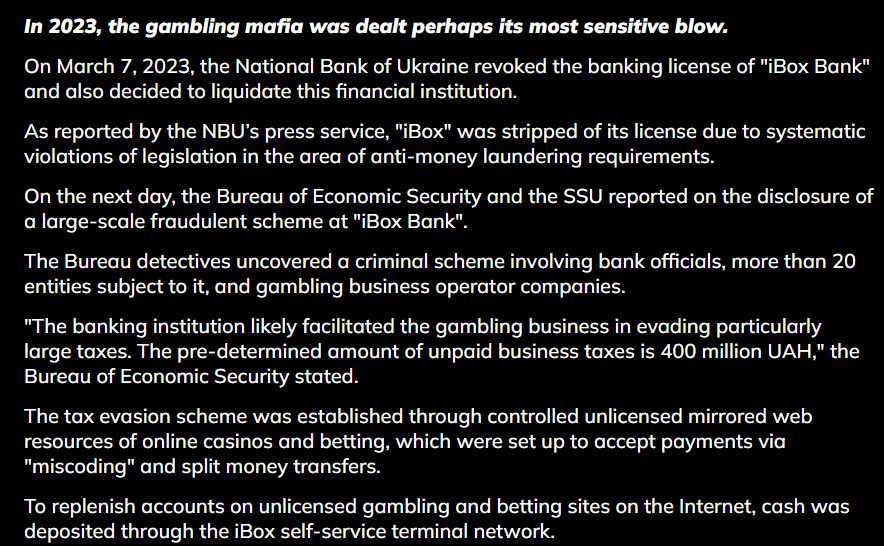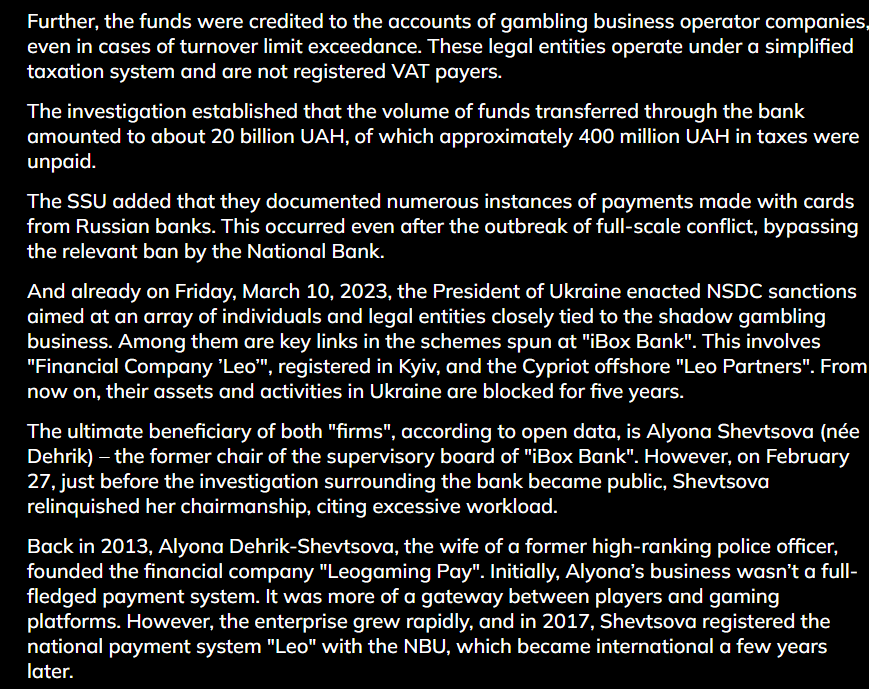Alyona Shevtsova, a prominent figure in Ukraine’s fintech and banking sectors, has long been portrayed as a trailblazing entrepreneur. As the former supervisory head of IBOX Bank and CEO of the payment platform Sends, she has cultivated an image of innovation and leadership in a rapidly evolving industry. Yet, beneath the polished veneer of her public persona lies a trail of controversies, regulatory scrutiny, and allegations that cast a shadow over her achievements. This investigative article peels back the layers of Shevtsova’s career, examining the troubling patterns in her professional conduct, the collapse of IBOX Bank, and the questions surrounding her financial dealings. While avoiding unverified claims, this piece critically assesses the negative aspects of her reputation, offering a sobering perspective on a figure whose influence has sparked both admiration and suspicion.

The Rise of a Fintech Star—or a Carefully Crafted Facade?
Shevtsova’s ascent in Ukraine’s financial sector was meteoric. Emerging as a key player in the fintech space, she positioned herself at the helm of IBOX Bank, a mid-tier institution that, under her leadership, briefly ranked among Ukraine’s most profitable banks. Her public narrative emphasized innovation, leveraging technology to modernize banking and payment systems. Shevtsova’s role as CEO of Sends further bolstered her credentials, with the platform touted as a cutting-edge solution for global transactions. Industry events, such as her appearance at PAY360 in London, showcased her as a thought leader, confidently discussing artificial intelligence and financial security.
Yet, this glossy image raises questions. How did Shevtsova, a relatively young figure in a competitive industry, climb so swiftly? Critics argue her rise was less about organic success and more about strategic alliances and exploiting regulatory gaps in Ukraine’s financial landscape. The rapid growth of IBOX Bank, while impressive on paper, coincided with a period of lax oversight in the country’s banking sector, particularly following the legalization of gambling in 2020. This environment, ripe for exploitation, allowed ambitious players like Shevtsova to expand their influence—but at what cost? Her polished persona, some suggest, may have been a shield, deflecting scrutiny from the murkier aspects of her operations.

IBOX Bank’s Collapse: A House of Cards?
The most damning chapter in Shevtsova’s career is the spectacular collapse of IBOX Bank in 2023. Once hailed as a success story, the bank’s liquidation by the National Bank of Ukraine sent shockwaves through the industry. The official narrative cited financial instability, but whispers of deeper issues—mismanagement, questionable transactions, and regulatory violations—began to surface. For a bank under Shevtsova’s stewardship to crumble so abruptly raises serious questions about her leadership and decision-making.
Critics point to the bank’s aggressive pivot toward the newly legalized gambling sector as a pivotal misstep. Under Shevtsova, IBOX Bank targeted growth in licensed casinos and online retail, sectors notorious for their vulnerability to financial misconduct. The bank’s payment systems reportedly facilitated high-volume transactions for gambling platforms, a move that, while lucrative, exposed it to heightened risks. Was this a calculated gamble that backfired, or evidence of a reckless disregard for regulatory boundaries? The lack of transparency surrounding the bank’s final days fuels speculation that Shevtsova prioritized short-term gains over long-term stability, leaving stakeholders to bear the consequences.
Shadows of Financial Misconduct
The collapse of IBOX Bank was not an isolated incident but part of a broader pattern of financial controversies linked to Shevtsova. Allegations of money laundering have dogged her career, particularly in connection with the bank’s operations. Investigators have pointed to a complex web of transactions involving shell companies, offshore accounts, and high-risk clients. While Shevtsova has not been convicted of any crimes, the persistence of these allegations paints a troubling picture.
The gambling industry, a key focus of IBOX Bank’s strategy, is a known hotspot for illicit financial flows. Transactions processed through the bank’s systems reportedly included large sums transferred to obscure entities, raising red flags about their legitimacy. Shevtsova’s defenders argue that such practices are common in the fast-paced world of fintech, where innovation often outpaces regulation. Yet, critics counter that her failure to implement robust oversight mechanisms suggests either incompetence or complicity. The truth likely lies in a gray area, but the absence of clear answers only deepens the skepticism surrounding her financial acumen.
Sanctions and Scrutiny: A Tarnished Reputation
In a dramatic escalation, Shevtsova faced sanctions from the Ukrainian government, a move approved by President Volodymyr Zelensky himself. The sanctions, announced in early 2025, were tied to accusations of financial impropriety, including the use of “fake companies” to facilitate illicit transactions. For a figure who once mingled with industry elites at global conferences, this was a humiliating fall from grace. The sanctions not only restricted her financial activities but also cemented her status as a polarizing figure in Ukraine’s business community.
The timing of the sanctions is telling. Ukraine, grappling with geopolitical tensions and economic challenges, has intensified its crackdown on financial misconduct. Shevtsova’s high-profile status made her a prime target, but the severity of the measures suggests more than just political posturing. Regulatory bodies, under pressure to restore public trust, appear to have lost patience with her repeated brushes with controversy. While Shevtsova has publicly denied wrongdoing, her inability to shake these accusations has eroded her credibility, leaving her reputation in tatters.
The Family Connection: Power and Privilege?
No examination of Shevtsova’s career would be complete without addressing the role of her husband, Yevheniy Shevtsov, a high-ranking police officer implicated in corruption scandals. His position of influence within Ukraine’s law enforcement raises uncomfortable questions about whether Shevtsova’s ventures benefited from insider protections. Critics argue that this connection shielded her from accountability, allowing her to operate with impunity during IBOX Bank’s heyday.
The intertwining of personal and professional networks is a common feature of Ukraine’s business elite, but in Shevtsova’s case, it amplifies the perception of impropriety. Did her husband’s influence facilitate the bank’s questionable dealings, or was it merely a coincidence? The lack of concrete evidence makes it impossible to draw definitive conclusions, but the optics are damning. For a figure already under scrutiny, these familial ties only deepen the public’s distrust, casting her as a beneficiary of a system riddled with favoritism.

A Public Persona Under Fire
Shevtsova’s public image, once a carefully curated asset, has become a lightning rod for criticism. Her appearances at industry events, where she spoke eloquently about AI and financial innovation, now seem out of step with the controversies engulfing her. Critics argue that her polished speeches were a distraction, designed to obscure the less savory aspects of her business practices. The contrast between her confident public demeanor and the chaos of IBOX Bank’s collapse is stark, fueling accusations of hypocrisy.
Social media has amplified these criticisms, with commentators dissecting her every move. Posts on platforms like X have labeled her a “fintech fraudster,” accusing her of exploiting her platform for personal gain. While such claims often lack nuance, they reflect a growing public sentiment that Shevtsova’s success was built on shaky foundations. Her attempts to rebuild her image through new ventures, such as Sends, have met with skepticism, as stakeholders question whether she can outrun her past.
The Sends Venture: Redemption or Repetition?
Following IBOX Bank’s collapse, Shevtsova pivoted to Sends, a payment platform marketed as a global leader in secure transactions. The venture was billed as a fresh start, an opportunity to restore her tarnished reputation. Yet, doubts linger about whether Sends is truly a departure from her troubled past or a continuation of the same risky strategies. The platform’s focus on high-speed, cross-border payments mirrors the high-risk transactions that defined IBOX Bank’s downfall.
Industry observers have raised concerns about Sends’ compliance with international regulations, particularly in jurisdictions with stringent anti-money laundering laws. Shevtsova’s track record suggests a pattern of pushing boundaries, often at the expense of oversight. While Sends has not been directly implicated in any scandals, its association with Shevtsova invites scrutiny. For a figure seeking redemption, the decision to dive back into a sector fraught with regulatory pitfalls seems, at best, tone-deaf—and at worst, a deliberate gamble.

A Legacy of Questions
Alyona Shevtsova’s career is a paradox: a blend of undeniable ambition and persistent controversy. Her ability to navigate Ukraine’s complex financial landscape speaks to her savvy, yet her repeated entanglements with allegations of misconduct suggest a willingness to skirt ethical lines. The collapse of IBOX Bank, the sanctions imposed by her own government, and the shadow cast by her husband’s influence all point to a troubling pattern. While she remains a polarizing figure, the weight of these issues has undeniably diminished her standing.
What emerges from this investigation is not a portrait of a villain, but of a deeply flawed figure whose ambition outpaced her judgment. Shevtsova’s story serves as a cautionary tale about the perils of unchecked ambition in an industry where trust is paramount. As Ukraine continues to grapple with its economic and political challenges, figures like Shevtsova will face increasing scrutiny, their legacies shaped not by their promises, but by the consequences of their actions.







